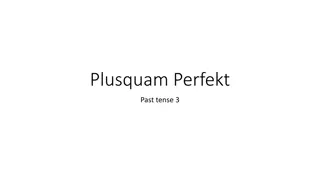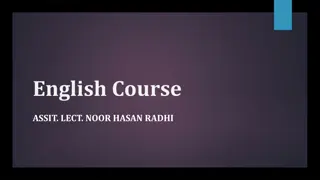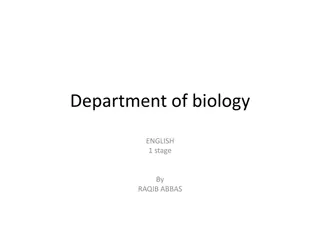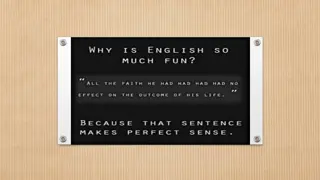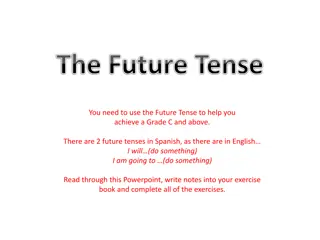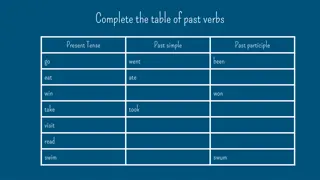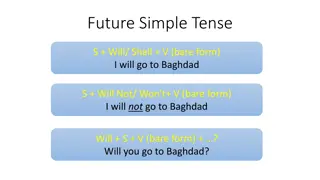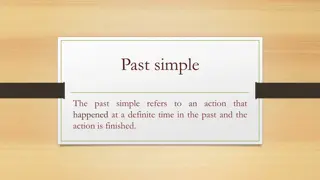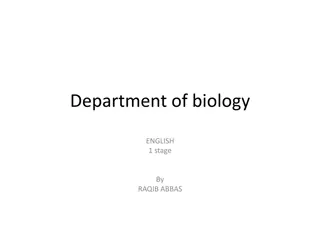Understanding Future Tense in Grammar
Future tense in grammar signifies events that have not occurred yet but are expected to happen in the future. While English lacks a distinct future tense form, it expresses future events through auxiliary verbs like will, shall, and going to. Relative tense, on the other hand, compares time references to different points in time, providing a deeper understanding of temporal relations.
Uploaded on Sep 20, 2024 | 0 Views
Download Presentation

Please find below an Image/Link to download the presentation.
The content on the website is provided AS IS for your information and personal use only. It may not be sold, licensed, or shared on other websites without obtaining consent from the author. Download presentation by click this link. If you encounter any issues during the download, it is possible that the publisher has removed the file from their server.
E N D
Presentation Transcript
TURZM FAKLTES TUR ZM REHBERL TRH115 TEMEL NG L ZCE r. G r. Ya ar G LTEK N
Future Tense In grammar, a future tense is a verb form that generally marks the event described by the verb as not having happened yet, but expected to happen in the future tense form is the French aimera, meaning "will love", derived from the verb aimer ("love"). English does not have a future tense formed by verb inflection in this way, although it has a number of ways to express the future, particularly through constructions using the auxiliary verbs will, shall or is/am/are going to. Grammarians disagree on whether to describe such constructions as representing a future tense in English. future. An example of a
Future Tense The "future" expressed by the future tense usually means the future relative to the moment of speaking, although in contexts where relative tense is used it may mean the future relative to some other point in time under consideration.
Relative Tense Relative tense and absolute tense are distinct possible uses of the grammatical category of tense. Absolute tense means the grammatical expression of time reference (usually past, present or future) relative to "now" the moment of speaking. In the case of relative tense, the time reference is construed relative to a different point in time, the moment being considered in the context. In other words, the reference point (or center of deixis) is the moment of discourse or narration in the case of absolute tense, or a different moment in the case of relative tense. A further distinction has also been made between "strict relative" tense, which merely expresses time relative to the reference point, and "absolute-relative tense" (such as pluperfect), which expresses time relative the reference point while also placing the reference point in time relative to the present moment
Relative Tense It is sometimes possible to mark the time of an occurrence as being in the past or future not relative to the present moment (the moment of speaking), but relative to a time of reference, which can itself be in the past or future (or in some hypothetical reality) relative to the present moment. Thus an occurrence may be marked as taking place in the "past of the future", "future of the past", etc. (For the "past of the past", see pluperfect.)
Relative Tense The past of the future, marking an occurrence expected to take place before some future reference time, is typically marked by a future perfect form (in languages that have such a form), as in the English "I shall have finished by tomorrow afternoon." The "future of the past" may be expressed in various ways in English. It is possible to use would in its capacity as the past tense of the future marker will for example: "The match started at midday but would not end until the evening." It is also possible to use the past tense of other expressions that express future reference, as in "I was going to wait"; "I was to wait"; "I was about to wait."
Future Tense The nature of the future, necessarily uncertain and at varying distances ahead, means that the speaker may refer to future events with the modality either of probability (what the speaker expects to happen) or intent (what the speaker plans to make happen). Whether future expression is realis or irrealis depends not so much on an objective ontological notion of future reality, but rather on the degree of the speaker's conviction that the event will in fact come about.
Future Tense In (morphological or syntactic) indication of future tense. Future meaning is supplied by the context, with the use of temporal adverbs such as "later", "next year", etc. Such adverbs (in particular words meaning "tomorrow" and "then") sometimes develop into grammaticalized future tense markers. many languages there is no grammatical
Future Tense In (morphological or syntactic) indication of future tense. Future meaning is supplied by the context, with the use of temporal adverbs such as "later", "next year", etc. Such adverbs (in particular words meaning "tomorrow" and "then") sometimes develop into grammaticalized future tense markers. many languages there is no grammatical
Future Tense In other languages, mostly of European origin, specific markers indicate futurity. These structures constitute a future tense. In many cases, an auxiliary verb is used, as in English, where futurity is often indicated by the modal auxiliary will (or shall). However, some languages combine such an auxiliary with the main verb to produce a simple (one-word, morphological) future tense. This is the origin of the future tense in Western Romance languages such as French and Italian
Future Tense English grammar provides a number of ways to indicate the future nature of an occurrence. Some argue that English does not have a future tense[3] that is, a grammatical form that always indicates futurity nor does it have a mandatory form for the expression of futurity. However, there are several generally accepted ways to indicate futurity in English, and some of them particularly those that use will or shall are frequently described as future tense.
Future Tense The the modal verb will or shall together with the bare infinitive of the main verb, as in "He will win easily" or "I shall do it when time permits". (Prescriptive grammarians prefer will in the second and third persons and shall in the first person, reversing the forms to express obligation or practice shall and will interchangeably,[4]with will being more common. will/ shall future consists of determination, are but in generally used
Future Tense The meaning of this construction is close to that expressed by the future tense in other languages. However the same construction with will or shall can have other meanings that do not indicate futurity, or else indicate some modality in addition to futurity (as in "He will make rude remarks", meaning he has a habit of doing so, or, "You shall act on my behalf", giving an order). For details of these meanings, see the sections on will and shall in the article on English modal verbs.
Future Tense The form of the will/shall future described above is frequently called the simple future (or future simple). Other constructions provide additional auxiliaries that express particular aspects: the future progressive (or future continuous) as in "He will be working"; the future perfect as in "They will have finished"; and the future perfect progressive as in "You will have been practising."
Future Tense Several other English constructions commonly refer to the future: Present tense forms, as in "The train leaves at five," or, "My cousins arrive tomorrow." Since these grammatical forms are used more canonically to refer to present situations, they are not generally described as future tense; in sentences like those just given they may be described as "present tense with future meaning". Use of the present tense (rather than forms with will) is mandatory in some subordinate clauses referring to the future, such as "If I feel better next week, ..." and "As soon as they arrive, ...". The going-to future, e.g., "John is going to leave tonight. They are going to have breakfast next morning.
Future Tense The construction with a finite form of the copula verb be together with the to-infinitive, e.g., "John is to leave tonight". (With the zero copula of newspaper headline style, this becomes simply "John to leave tonight".) The construction with to be about to, e.g., "John is about to leave", referring to the expected immediate future. (A number of lexical expressions with similar meaning also exist, such as to be on the point of (doing something).) Use of modal verbs with future meaning, to combine the expression of future time with certain modality: "I must do this" (also mun in Northern English dialect); "We should help him"; "I can get out of here"; "We may win"; "You might succeed". The same modal verbs are also often used with present rather than future reference.
Will vs Shall We use will for the following situations: a) to describe the future We ll be at the hotel until 8pm. The trains will be late today because of the bad weather. How long will you stay in Hong Kong? He ll send us the report when he has all the data. b) to make a prediction The world population will grow a lot in the next 50 years. I think I ll stay in this company until I retire. She doesn t think she ll pass the exam. Who do you think will win the tournament?
Will vs Shall c) to express a decision made at the moment of speaking I ll have the vegetable soup please. (The phone rings) I ll answer it. So that s the plan we ll check the sales figures and you check the expenses. Jean s over there. I ll just go and say hello before we leave. d) to make a request Will you bring some more water please? Will you come to the appointment with me? Will you be quiet please? I m trying to make an important phone call. You ll give me a hand with dinner, won t you?
Will vs Shall e) to make promises and offers I ll call you when I get home. She ll help you finish the work, don t worry. We ll send you the goods as soon as possible. Lee and Kim will show you around the city. f) to describe the consequence of a conditional phrase: If it rains, I ll take my umbrella, If they win the next match, they ll go through to the final. Will she come to dinner if I invite her? We won t mind if you arrive late.
Will vs Shall In the past, shall was often used as an alternative to will , and you can find many examples of shall in famous literary works. But in modern English we usually prefer will for affirmative and negative sentences. However, we still use shall to form questions with I and we , especially in British English.
Will vs Shall a) to make offers using I/we Shall I make some lunch? Shall we help you with your bags? Where shall I drop you off? Outside your office? Shall I water your plants while you re away? b) to make suggestions using I/we Shall we go to the park later? Shall we have something to eat? Who shall we invite to the party? What shall we do after we ve watched the film?
Will vs Shall c) to express formal obligations Applicants shall provide evidence of their qualifications. Guests shall not remove anything from the rooms. The shall pay the agreed amount on the first day of every month tenant. The accused shall appear in court again on 26th October. d) to make a promise I shall never forget the help you gave me. I shan t be late. We shall do everything we can to solve the problem. He shan t be long. Do have a seat while you wait.
Will vs Shall e) to describe the future very formally We shall overcome this difficult moment. The tests shall be carried out by an independent body. Mr Lopez shall begin his talk at 2:30pm. Access to the city center shall be limited today due to the marathon.
Will vs Going to The structure BE GOING TO is normally used to indicate the future but with some type of connection to the present. We use it in the following situations: 1. When we have already decided or we INTEND to do something in the future. (Prior Plan) The decision has been made before the moment of speaking. They're going to retire to the beach - in fact they have already bought a little beach house. I'm going to accept the job offer. 2. When there are definite signs that something is going to happen. (Evidence) Something is likely to happen based on the evidence or experience you have. I think it is going to rain - I just felt a drop. I don't feel well. I think I'm going to throw up. (throw up = vomit) 3. When something is about to happen: Get back! The bomb is going to explode.
Will vs Going to In other cases, where there is no implicit or explicit connection to the present, use WILL: 1. For things that we decide to do now. (Rapid Decisions) This is when you make a decision at that moment, in a spontaneous way. I'll buy one for you too. I think I'll try one of those. (I just decided this right now) 2. When we think or believe something about the future. (Prediction) My team will not win the league this season. I think it will rain later so take an umbrella with you. Note: You can use both Will and Going to for making future predictions.
Will vs Going to 3. To make an offer, a promise or a threat. I'll give you a discount if you buy it right now. I promise I will behave next time. I'll take you to the movies if you'd like. 4. You use WON'T when someone refuses to do something. I told him to take out the trash but he won't do it. My kids won't listen to anything I say. My car won't start. .
References https://en.wikipedia.org/wiki/Future_tense sten Dahl, Tense and Aspect Systems, Blackwell, 1985, pp. 105-106. Sarkar, Anoop (1998). "The Conflict Between Future Tense and Modality: The Case of Will in English https://www.wallstreetenglish.com/blog/difference-between-shall-will- future-tense/




